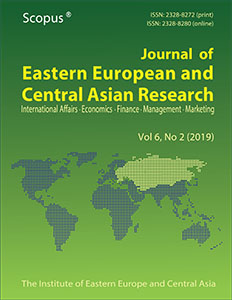Welcoming Dr. Shakhzod Saydullaev to the JEECAR Editorial Team
We are delighted to announce the appointment of Dr. Shakhzod Saydullaev from Tashkent State University of Economics, Uzbekistan, to the JEECAR Editorial Team as a WoS Academy Certified Peer Reviewer. Dr. Saydullaev's exceptional dedication to academic excellence is commendable. Please join us in celebrating his significant achievement and the valuable contributions he brings to our Journal JEECAR.
Congratulations, Dr. Saydullaev!


 Journal of Eastern European and Central Asian Research (JEECAR) is a multi-disciplinary, high-quality, scholarly, double-blind peer-reviewed journal published quarterly. It publishes advanced concepts and fundamental research in key fields of Eastern European and Central Asian business and national political economies. We welcome manuscripts from the perspective of current scholarly work conducted in universities and research institutions. The Journal shall enlighten its readership by covering academicians and practitioners and providing a venue for the publication of scholarly research. Authors must present original, empirical, or theoretical papers and book reviews.
Journal of Eastern European and Central Asian Research (JEECAR) is a multi-disciplinary, high-quality, scholarly, double-blind peer-reviewed journal published quarterly. It publishes advanced concepts and fundamental research in key fields of Eastern European and Central Asian business and national political economies. We welcome manuscripts from the perspective of current scholarly work conducted in universities and research institutions. The Journal shall enlighten its readership by covering academicians and practitioners and providing a venue for the publication of scholarly research. Authors must present original, empirical, or theoretical papers and book reviews.





